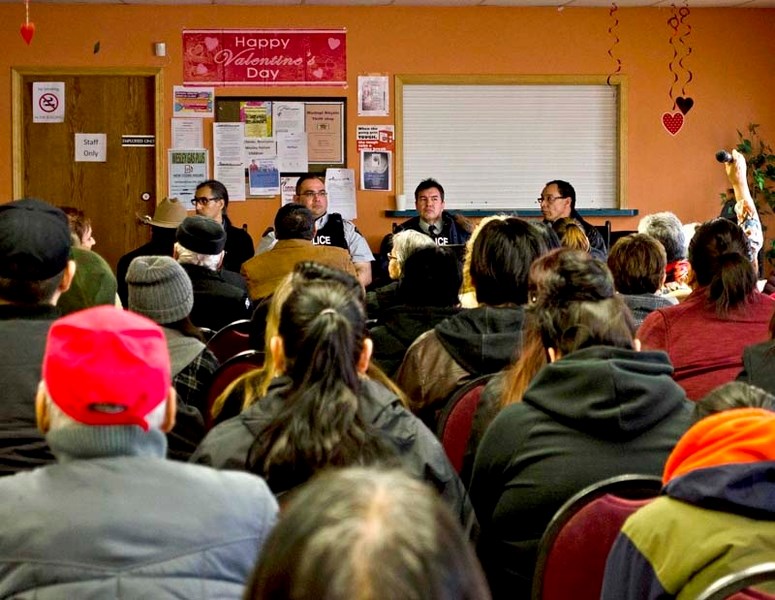With a crime-heavy start to 2017 and residents and elders pointing to drugs as the source, the Wesley band hosted a meeting earlier this week to address residents’ concerns.
“This is a crisis we don’t even have a name for in our language – crystal meth,” organizer Krista Hunter stated at the beginning of the meeting.
“We need to start thinking of the next generation. We are warriors … and we need to battle this demon upon us.”
The Wesley band administration – one of the three bands that comprise Stoney Nakoda First Nation – invited community members to the Chief Goodstoney Rodeo Centre Tuesday to listen and brainstorm solutions.
Cochrane RCMP officers previously confirmed with the Eagle that fentanyl and methamphetamine were drugs prevalent on the Nation, and pointed to possible overdoses, successful overdoses and other crimes related to opioids.
“Every week, I was going to a funeral where it was the same thing over and over again,” Const. Donald Vanderrick, who spoke at the meeting, said about the drug use on the Nation.
“We know things are out there. We know who the drugs dealers are but knowing and proving are two different things … We need more people to come forward with information.”
Some community members asked what to do if they were afraid to come forward with information.
The options presented included calling Crime Stoppers, which is anonymous; calling the detachment and asking for your name to not be broadcasted over the scanner; or talking in person to an RCMP officer.
“We are not interested in charging the victims,” Vanderrick said.
Nation resident Georgina Twoyoungmen stated the problems with First Nation people began with residential schools, which forced multiple generations of people to attend the schools over 100 years in Canada. The last school closed in 1996.
“The pain has been coming down and down and down and we need to acknowledge what happened … a lot of the time our homes are broken and the children feel abandoned,” Twoyoungmen said.
“I’ve lived through it. I don’t blame the people who raised me for not knowing how to parent – people use addiction to numb the pain that has been coming down from generations and we need to stop that.”
One of the other keynote speakers at the meeting echoed Twoyoungmen’s comments saying people were trying to heal colonial pain with medication and it was not working.
“This is a national and international problem and Canada is the second worst country for problems with opioids and Alberta is the worst province,” said Dr. Chris Sarin, First Nations and Inuit Health Branch medical adviser.
Two former drug addicts, who currently live on the Nation, spoke up at the meeting both asking what the next step was.
“It almost took a year to get off of (drugs) – what will be offered here to help our people,” said Robert Rabbitt with the Wesley band.
Sarin said opioid treatment was not easy and with the province facing a crisis, 343 people dying of apparent drug overdoses related to fentanyl last year, the province would be working with communities for harm reduction programs.
Acting tribal administrator Ken Christensen asked what a harm reduction plan would look like for Morley. Sarin replied that Alberta thinks about how the services would work with users, stating other communities have implemented programs such as needle exchanges.
“The short term focus is saving lives,” Sarin said.
FACTBOX
What are opioids?
According to the Government of Canada’s website, opioids are medicines generally used to manage pain. They relieve pain by acting on specific nerve cells of the spinal cord and brain. Youth may have a misperception that prescription drugs are less dangerous when abused than illicit drugs because they are prescribed by a doctor.
Opioids relieve pain by acting on specific nerve cells in the spinal cord and brain.
Examples of opioids include:
oxycodone
morphine
hydromorphone
fentanyl
codeine
Opioids come in many forms, such as:
tablets
capsules
syrups
liquids for injection
nose sprays
skin patches
suppositories




